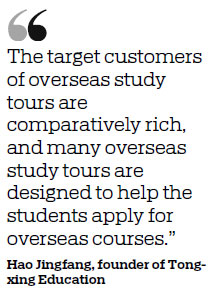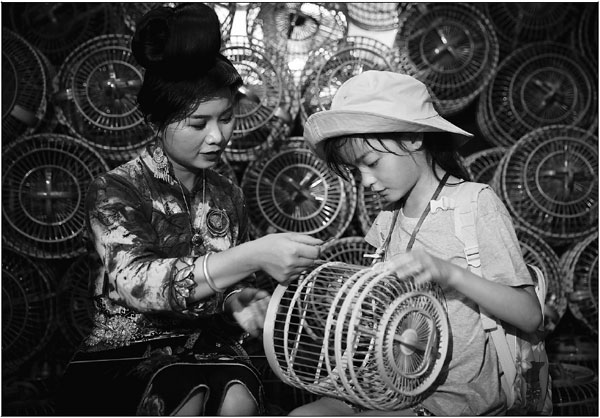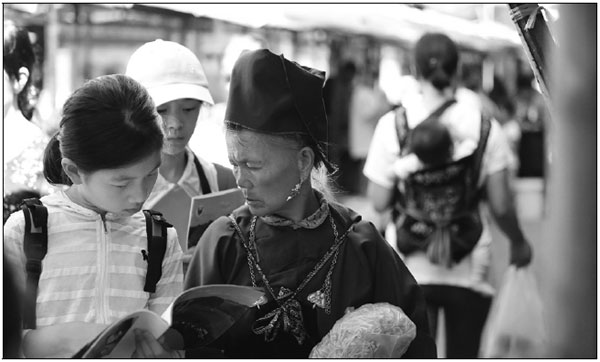Study tours, camps gaining in popularity
While still seen as a luxury by many, demand is growing for domestic and overseas educational adventures for children
Summer vacation is fast becoming an expensive undertaking for many Chinese parents, especially with the growing popularity of study tours among Chinese students.
Study tours, which offer experiential learning during travel and have a comparatively long history in developed countries, have become increasingly popular in China in recent years.
In the 1990s, Chinese students began going to summer camps to visit scenic spots and historical sites, and to interact with nature. And study tours have gained in popularity in China in the 21st century.
|
A student on a study tour learns to make a birdcage in Kala village, Danzhai county, Guizhou province. Cai Jingyi / For China Daily |
|
A student talks to a woman from the Miao ethnic group at a fair in Danzhai county, Guizhou province. Chen Yule / For China Daily |
According to a white paper on study tours and camp education jointly issued by domestic leading education group New Oriental Education and consulting company i-research in 2019, 31.21 million people participated in study tours at home and abroad in 2018, with 30.16 million people participating domestically and about 1.05 million people going overseas last year.
The industry's overall market scale was about 94.6 billion yuan ($13.3 billion) in 2018, and the market will maintain an annual growth rate of at least 20 percent in the future, according to the white paper.
Other surveys also show Chinese families' growing enthusiasm and consumption power in the sector. Leading domestic online travel agency Ctrip recently released its 2019 summer study tour report based on the bookings on the Ctrip study tour platform. In the summer of 2019, the average amount spent on a single summer study tour was 8,641 yuan, while the average amount per family was about 22,000 yuan.
Many social and economic factors have contributed to the success of the study tour industry. Because study tours involve education and traveling, both tourism and education authorities have issued documents to support their development.
The Outline for National Travel and Leisure issued by the State Council in 2013 promoted the concept of study tours for the first time. The State Council further issued a guidance on promoting tourism industry reform and development in 2014 to encourage social educational organizations to provide study tour products such as summer and winter camps. In 2016, the Ministry of Education issued a document on promoting primary and middle school study tours, incorporating the practice into primary and middle school's teaching programs.
In a nation that places an emphasis on education, most Chinese parents spare no expense when it comes to their children's education and the enthusiasm for investing in education is increasing in line with the rapid social and economic development, especially considering that the majority of Chinese families have only one or two children.
But to a large extent study tours still seem to be a luxury rather than a necessity for many Chinese students. The increasing demand for study tours has much to do with the growth in size of the middle-income group, and transition from exam-oriented education to quality education in contemporary China.

Last year, the spokesman for the National Bureau of Statistics Mao Shengyong said the population of China's middle-income group has exceeded 300 million, according to conservative estimates, which accounts for 30 percent of the global middle-income group. And the young parents among them are the main clients of study tours.
Children participating in study tour activities are mainly primary and middle school students. And their parents are always well-educated and from the post-1970 and post-1980 generations that work and live in first-and second-tier cities.
Study tours have become part of a trend among these young well-educated middle-income parents, as they tend to pay more attention to their children's all-round physical and mental development, rather than simply wanting them to get high scores in tests.
Although the industry is growing, market concentration is comparatively low and there is far from sufficient competition. According to the white paper, there are estimated to be several thousand domestic market players, while the market share of the industry's leading companies is between 1 and 2 percent.
"High decentralization is the nature of not only the study tour industry but also the entire education industry," said Hao Jingfang, Hugo award winner and the founder of Tongxing Education, a Beijing-based liberal education institution that organizes project-based learning study tour camps for children aged from 4 to 12 years old.
"The joint market share of leading domestic education groups New Oriental Education and TAL education is less than 5 percent," Hao said. "It is hard to form a monopoly in the children's education field, especially for offline scenarios like study tours."
That's why quite a few study tour organizations are sparing no efforts to attract customers by offering unique features. As most domestic study tour projects focus on natural education or camp education, pragmatic quality education studio LTBH (Learn to be Human), which was founded by several graduates of Peking University, aims to build a link between urban kids and traditional Chinese rural culture and intangible heritage.
"Inspired by famous Chinese sociologist, Peking University professor Fei Xiaotong's masterpiece From the Soil - The Foundations of Chinese Society, we want to help children observe and understand the countryside and rural society through sociological methods such as field trips," said Su Bangxing, co-founder of LTBH, "that's what we called pragmatic quality education."
Statistics show that overseas study tours only account for a small market portion despite the fact that the average expenditure on an overseas study tour of 20,000 to 50,000 yuan per person is much higher than the 3,000 to 8,000 yuan spent on a domestic study tour.
"The target customers of overseas study tours are comparatively rich, and many overseas study tours are designed to help the students apply for overseas courses," said Hao.
The main players in the overseas study tour market are well-known education organizations with high market recognition, overseas study application agencies with the advantage of foreign educational resources and some small customized training studios.
JStudio is an overseas study training studio aimed at students of architecture and landscape design applying to further their studies at foreign universities. The design-theme study tour in England it organizes is a side product of their overseas study application business. The tour guides are foreign academic leaders and professional designers and students visit the world's leading design offices during the trip.
"The biggest advantage of our study tour is our professional training studio," said Dong Huaguan, co-founder of JStudio. "Which is not only a training organization but also a research organization that can help these students in their overseas academic studies."
Various kinds of study tours show the industry in China is still a blue ocean. Hao said, China's study tour industry is "big enough and diversified enough to let both big companies and small studios thrive together."
Contact the writer at wangyiqing@chinadaily.com.cn
(China Daily Global 09/13/2019 page8)




















